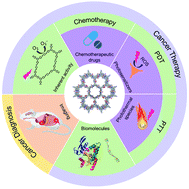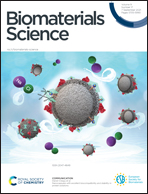Recent advances in covalent organic frameworks for cancer diagnosis and therapy
Abstract
In recent years, the number of patients diagnosed with cancer has been soaring. Therefore, the design, development, and implementation of new approaches for the diagnosis and therapy of different types of cancers have attracted an increasing amount of attention. To date, different methods have been used for cancer diagnosis and therapy with main drawbacks in terms of severe side effects, e.g., damage to healthy cells, development of drug resistance and tumor recurrence. Therefore, there is an urgent need for the introduction and application of innovative methods. Covalent organic frameworks (COFs) are versatile materials with excellent properties in terms of biocompatibility, porous and crystalline structure, and easy functionalization. The porous structure and organic monomers in COFs allow them to load different therapeutic drugs and/or functional species efficiently. These promising properties make COFs ideal candidates for medical application, especially in cancer diagnosis and therapy. To date, many studies have focused on the design and synthesis of novel COFs while their application as diagnostic and therapeutic materials remains less understood. In this review, different synthesis and functionalization approaches of COFs were summarized. In particular, cancer diagnosis and therapy based on COFs were investigated and the advantages and limitations of each method were discussed. Most importantly, the mechanism for cancer therapy of COFs and fundamental challenges and perspectives for the application of COFs in cancer theranostics were assessed.



 Please wait while we load your content...
Please wait while we load your content...